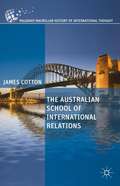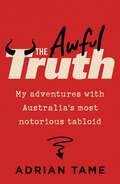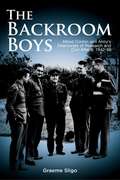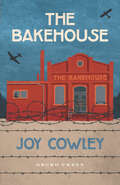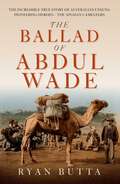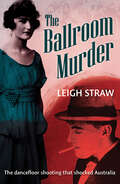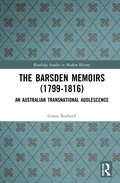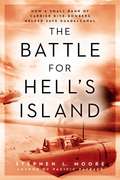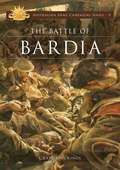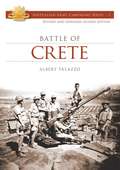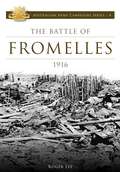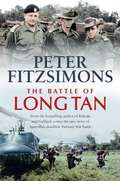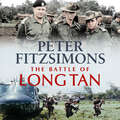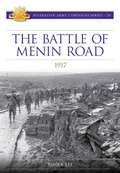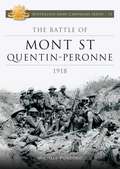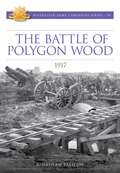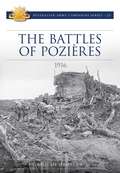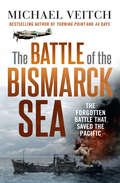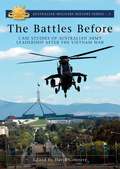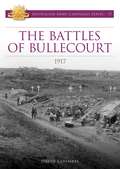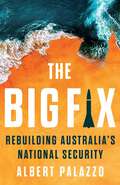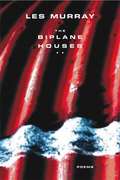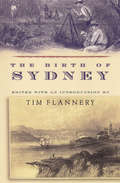- Table View
- List View
The Australian School of International Relations
by James CottonThis book offers the first comprehensive account of the emergence of the IR discipline in Australia. Initially influenced by British ideas, the first generation of Australian international relations practitioners demonstrated in their work a strong awareness of the unique local conditions to which their theorizing should respond.
The Awful Truth: My adventures with Australia's most notorious tabloid
by Adrian TameBefore Fake News, there was the real Fake News. There was Truth. Hailed as &‘a fearless exposer of folly, vice and crime&’ when it first hit the streets in the 1890s, Truth was later condemned by a High Court Judge as &‘a wretched little paper, reeking of filth, injurious to the health of house servants and young girls&’. Much later it earned the nickname &‘The Old Whore of La Trobe Street&’. Truth was called many things but it was never boring. Adrian Tame knows that better than anyone as he worked for Truth for more than a decade as a reporter and news editor. In the years it was owned by the Murdoch family he worked alongside young Rupert as he cut his teeth on the shock horror scandals that graced the pages of Truth when it was selling a whopping 400,000 copies a week. Funny, often outrageous and always thoroughly entertaining, The Awful Truth is a rollercoaster ride through an colourful era of newspapers and larger-than-life reporters that we will never see the like of again.
The Backroom Boys: Alfred Conlon and Army's Directorate of Research and Civil Affairs,1942-46
by Graeme SligoThe Backroom Boys is the remarkable, but little known, story of how a varied group of talented intellectuals, drafted into the Australian Army in the dark days of 1942, provided high-level policy advice to Australia’s most senior soldier, General Blamey, and through him to the Government for the remainder of the war and beyond. This band of academics, lawyers and New Guinea patrol officers formed a unique military unit, the Directorate of Research and Civil Affairs, under the command of an eccentric and masterful string-puller, Alf Conlon. The Directorate has been depicted as a haven for underemployed poets or meddlesome soldier-politicians. Based on wide-ranging research, this book reveals a fuller and more fascinating picture. The fierce conflicts in the wartime bureaucracy between public servants and soldiers, in which the Directorate provided critical support to Blamey, went to the heart of military command, accountability and the profession of arms. The Directorate was a pioneer in developing approaches to military government in areas liberated by the combat troops, as demonstrated by the Australian Army in New Guinea, and Borneo in 1945-46. It is an issue of enduring importance. The Directorate established the Australian School of Pacific Administration, and had an important role in founding the Australian National University. Its influence extended into post war Australia. The Backroom Boys emphasises the personality of Colonel Alf Conlon, as well as the talented men and women he recruited. Above all, this book shows how, unexpectedly, the Australian Army fostered a group of men and women who made a lasting contribution to the development of Australia in the decades after the war.
The Bakehouse
by Joy CowleyBert wants nothing more than to be old enough to fight in the war—to handle weapons, defend his country, and have a life filled with adventure. Little does he know that the secrets and danger of war don't always stay at the front line, and that one boy's actions can change everything.
The Ballad of Abdul Wade: The Incredible True Story of Australia's unsung Pioneering Heroes - The Afghan Cameleers
by Ryan ButtaWhen Afghan entrepreneur Abdul Wade first brought his camel trains to the outback, he was hailed as a hero. Horses couldn't access many remote settlements, especially those stricken by flood or drought, and camel trains rode to the rescue time and time again.But with success came fierce opposition fuelled by prejudice. The camel was not even classed as an animal under Australian law, and, in a climate of colonial misinformation, hyperbole and fear, camel drivers like Wade were shown almost as little respect. Yet all the while, for those in need, the ships of the desert continued to appear on the outback horizon.After his interest was piqued by a nineteenth-century photo of a camel train in a country town, Ryan Butta found himself on the trail of Australia's earliest Afghan camel drivers. Separating the bulldust from the bush poetry, he reveals the breadth and depth of white Australian protectionism and prejudice. Told with flair and authority, this gritty alternative history defies the standard horse-powered folklore to reveal the untold debt this country owes to the humble dromedary, its drivers and those who brought them here.
The Ballad of Abdul Wade: The Incredible True Story of Australia's unsung Pioneering Heroes - The Afghan Camelleers
by Ryan ButtaWhen Afghan entrepreneur Abdul Wade first brought his camel trains to the outback, he was hailed as a hero. Horses couldn't access many remote settlements, especially those stricken by flood or drought, and camel trains rode to the rescue time and time again.But with success came fierce opposition fuelled by prejudice. The camel was not even classed as an animal under Australian law, and, in a climate of colonial misinformation, hyperbole and fear, camel drivers like Wade were shown almost as little respect. Yet all the while, for those in need, the ships of the desert continued to appear on the outback horizon.After his interest was piqued by a nineteenth-century photo of a camel train in a country town, Ryan Butta found himself on the trail of Australia's earliest Afghan camel drivers. Separating the bulldust from the bush poetry, he reveals the breadth and depth of white Australian protectionism and prejudice. Told with flair and authority, this gritty alternative history defies the standard horse-powered folklore to reveal the untold debt this country owes to the humble dromedary, its drivers and those who brought them here.
The Ballroom Murder
by Leigh StrawIn August 1925, Audrey Jacob shot dead her former fiancé, Cyril Gidley, in full view of hundreds of guests at a charity ball in Perth's Government House. When she was arrested, she still held the gun in her hand. It was a open and shut case of wilful murder – that is until Jacob assigned prosecutor Arthur Haynes to her defence. His ability to play the press and the jury for sympathy would lead to a sensational result. Not only did Jacob escape the gallows, she was found not guilty of Gidley's murder. Straw, the author of a number of books about notable Australian female criminals, tells a story that is rich with first-hand newspaper accounts from the day.
The Barsden Memoirs: An Australian Transnational Adolescence (Routledge Studies in Modern History)
by Grant RodwellCovering the life of Josephus Henry Barsden from his birth in 1799 through his childhood to 16 years of age, the Barsden memoirs describe events from a Sussex smugglers’ inn, a convict ship to the colony of New South Wales, sealing and whaling expeditions to Van Diemen’s Land, and Barsden’s participation in a Tahitian civil war. The author assesses the value of memoirs, and of these memoirs in particular to students of history in respect to the transnational paradigm. He tests the historicity and veracity of their contents, and provides an engaging exegesis and graphical supplement of its contents. Of central importance is Barsden’s account of the Battle of Fe’i Pi, which was in many respects the Pacific’s equivalent to the contemporaneous Battle of Waterloo, such was its lasting impact on Pacific geopolitics. This was no ordinary childhood, and poses many questions about a transnational adolescent’s impact on major events. A fascinating read for scholars and students of Australian, Pacific, and British Colonial History, written with academic rigour but accessible to non-specialists.
The Battle for Hell's Island
by Stephen L. MooreFrom the author of Pacific Payback comes the gripping true story of the Cactus Air Force and how this rugged crew of Dive-Bombers helped save Guadalcanal and won the war.November 1942: Japanese and American forces have been fighting for control of Guadalcanal, a small but pivotal island in Japan's expansion through the South Pacific. Both sides have endured months of grueling battle under the worst circumstances: hellish jungles, meager rations, and tropical diseases, which have taken a severe mental and physical toll on the combatants. The Japanese call Guadalcanal Jigoku no Jima--Hell's Island.Amid a seeming stalemate, a small group of U.S. Navy dive bombers are called upon to help determine the island's fate. The men have until recently been serving in their respective squadrons aboard the USS Lexington and the USS Yorktown, fighting in the thick of the Pacific War's aerial battles. Their skills have been honed to a fine edge, even as injury and death inexorably have depleted their ranks. When their carriers are lost, many of the men end up on the USS Enterprise. Battle damage to that carrier then forces them from their home at sea to operating from Henderson Field, a small dirt-and-gravel airstrip on Guadalcanal.With some Marine and Army Air Force planes, they help form the Cactus Air Force, a motley assemblage of fliers tasked with holding the line while making dangerous flights from their jungle airfield. Pounded by daily Japanese air assaults, nightly warship bombardments, and sniper attacks from the jungle, pilots and gunners rarely last more than a few weeks before succumbing to tropical ailments, injury, exhaustion, and death. But when the Japanese launch a final offensive to take the island once and for all, these dive-bomber jocks answer the call of duty--and try to perform miracles in turning back an enemy warship armada, a host of fighter planes, and a convoy of troop transports.A remarkable story of grit, guts, and heroism, The Battle for Hell's Island reveals how command of the South Pacific, and the outcome of the Pacific War, depended on control of a single dirt airstrip--and the small group of battle-weary aviators sent to protect it with their lives.
The Battle for Hell's Island: How a Small Band of Carrier Dive-Bombers Helped Save Guadalcanal
by Stephen L. MooreFrom the author of Pacific Payback comes the gripping true story of the Cactus Air Force and how this rugged crew of Dive-Bombers helped save Guadalcanal and won the war.November 1942: Japanese and American forces have been fighting for control of Guadalcanal, a small but pivotal island in Japan's expansion through the South Pacific. Both sides have endured months of grueling battle under the worst circumstances: hellish jungles, meager rations, and tropical diseases, which have taken a severe mental and physical toll on the combatants. The Japanese call Guadalcanal Jigoku no Jima--Hell's Island.Amid a seeming stalemate, a small group of U.S. Navy dive bombers are called upon to help determine the island's fate. The men have until recently been serving in their respective squadrons aboard the USS Lexington and the USS Yorktown, fighting in the thick of the Pacific War's aerial battles. Their skills have been honed to a fine edge, even as injury and death inexorably have depleted their ranks. When their carriers are lost, many of the men end up on the USS Enterprise. Battle damage to that carrier then forces them from their home at sea to operating from Henderson Field, a small dirt-and-gravel airstrip on Guadalcanal.With some Marine and Army Air Force planes, they help form the Cactus Air Force, a motley assemblage of fliers tasked with holding the line while making dangerous flights from their jungle airfield. Pounded by daily Japanese air assaults, nightly warship bombardments, and sniper attacks from the jungle, pilots and gunners rarely last more than a few weeks before succumbing to tropical ailments, injury, exhaustion, and death. But when the Japanese launch a final offensive to take the island once and for all, these dive-bomber jocks answer the call of duty--and try to perform miracles in turning back an enemy warship armada, a host of fighter planes, and a convoy of troop transports.A remarkable story of grit, guts, and heroism, The Battle for Hell's Island reveals how command of the South Pacific, and the outcome of the Pacific War, depended on control of a single dirt airstrip--and the small group of battle-weary aviators sent to protect it with their lives.
The Battle of Bardia (Australian Army Campaigns #9)
by Craig StockingsOn the morning of 3 January 1941, Australians of the 6th Division led an assault against the Italian colonial fortress village of Bardia in Libya, not far from the Egyptian-Libyan frontier. The ensuing battle was the second of the First Libyan Campaign, but the first battle of the Second World War planned and fought predominantly by Australians. The fortress fell to the attackers a little over two days after the attack began, in what could only be described as a remarkable victory. At a cost of 130 killed and 326 wounded, the 6th Division captured around 40,000 Italian prisoners and very large quantities of military stores and equipment. The victory was heralded at the time in Australia as one of the greatest military achievements of that nation's military history. Quite soon afterwards, however, overshadowed perhaps by Rommel's subsequent desert advances, the tragedy in Greece, and the war in the Pacific, Bardia slipped from the public mind. Very few Australians today have heard of the battle. This book attempts to bring Bardia back into the light.
The Battle of Crete (Australian Army Campaigns #1)
by Albert PalazzoBetween 20 May and 1 June 1941 the Second World War came to the Greek island of Crete. The Commonwealth defenders consisted of Australian, New Zealand and British refugees from the doomed Greek Campaign who had not recovered from defeat.
The Battle of Fromelles 1916: A Case Study Of An Evolving Skill (Australian Army Campaigns #8)
by Roger LeeThe Battle of Fromelles remains the single bloodiest day in terms of soldiers killed, wounded or missing, in Australia's military history. Remains of soldiers were recently discovered in mass graves in northern France and the final soldier will be laid to rest when a new cemetery officially opens on 19th July, 2010 - the 94th anniversary of the battle.
The Battle of Long Tan
by Peter FitzSimonsFrom the bestselling author of Kokoda and Gallipoli comes the epic story of Australia's deadliest Vietnam War battle.4.31 pm: Enemy [on] left flank. Could be serious.5.01 pm: Enemy ... penetrating both flanks and to north and south.5.02: Running short of ammo. Require drop through trees.It was the afternoon of 18 August 1966, hot, humid with grey monsoonal skies. D Company, 6RAR were four kilometres east of their Nui Dat base, on patrol in a rubber plantation not far from the abandoned village of Long Tan. A day after their base had suffered a mortar strike, they were looking for Viet Cong soldiers. Then - just when they were least expecting - they found them. Under withering fire, some Diggers perished, some were grievously wounded, the rest fought on, as they remained under sustained attack.For hours these men fought for their lives against the enemy onslaught. The skies opened and the rain fell as ferocious mortar and automatic fire pinned them down. Snipers shot at close quarters from the trees that surrounded them. The Aussie, Kiwi and Yankee artillery batteries knew it was up to them but, outnumbered and running out of ammunition they fired, loaded, fired as Viet Cong and North Vietnamese Army forces just kept coming. And coming.Their only hope was if Armoured Personnel Carriers (APCs) could reach them before they were wiped out. The APCs did their best but low cloud and thunderstorms meant air support was stalled. A daring helicopter resupply mission was suggested but who would want to fly that? The odds against this small force were monumental...By far the deadliest battle for Australian forces in Vietnam, the Battle of Long Tan has a proud place in the annals of Australian military history - and every ANZAC who fought there could hold his head high.Peter FitzSimons, Australia's greatest storyteller, tells the real story of this classic battle. He reveals the horror, the bravery, the wins and the losses that faced our soldiers. He brings to life the personal stories of the men who fought, the events leading up to that memorable battle and the long war that followed, and the political decisions made in the halls of power that sealed their fates. The Battle of Long Tan is an engrossing and powerful history that shows the costs of war never end.
The Battle of Long Tan
by Peter FitzSimonsFrom the bestselling author of Kokoda and Gallipoli comes the epic story of Australia's deadliest Vietnam War battle.4.31 pm: Enemy [on] left flank. Could be serious.5.01 pm: Enemy ... penetrating both flanks and to north and south.5.02: Running short of ammo. Require drop through trees.It was the afternoon of 18 August 1966, hot, humid with grey monsoonal skies. D Company, 6RAR were four kilometres east of their Nui Dat base, on patrol in a rubber plantation not far from the abandoned village of Long Tan. A day after their base had suffered a mortar strike, they were looking for Viet Cong soldiers. Then - just when they were least expecting - they found them. Under withering fire, some Diggers perished, some were grievously wounded, the rest fought on, as they remained under sustained attack.For hours these men fought for their lives against the enemy onslaught. The skies opened and the rain fell as ferocious mortar and automatic fire pinned them down. Snipers shot at close quarters from the trees that surrounded them. The Aussie, Kiwi and Yankee artillery batteries knew it was up to them but, outnumbered and running out of ammunition they fired, loaded, fired as Viet Cong and North Vietnamese Army forces just kept coming. And coming.Their only hope was if Armoured Personnel Carriers (APCs) could reach them before they were wiped out. The APCs did their best but low cloud and thunderstorms meant air support was stalled. A daring helicopter resupply mission was suggested but who would want to fly that? The odds against this small force were monumental...By far the deadliest battle for Australian forces in Vietnam, the Battle of Long Tan has a proud place in the annals of Australian military history - and every ANZAC who fought there could hold his head high.Peter FitzSimons, Australia's greatest storyteller, tells the real story of this classic battle. He reveals the horror, the bravery, the wins and the losses that faced our soldiers. He brings to life the personal stories of the men who fought, the events leading up to that memorable battle and the long war that followed, and the political decisions made in the halls of power that sealed their fates. The Battle of Long Tan is an engrossing and powerful history that shows the costs of war never end.
The Battle of Menin Road 1917 (Australian Army Campaigns #20)
by Roger LeeThe Passchendaele Campaign of 1917 is associated with images of slimy, oozing mud: mud deep enough and glutinous enough to drown men, horses and equipment, mud so pervasive that it, rather than the enemy, defeated the British Army’s only major campaign in Belgium. While these images are certainly true for the opening and final months of the campaign, mud was not he defining experience for the infantry of the Australian First and Second Divisions when, for the first time in history, two Australian Divisions fought a battle side by side in the Battle of Menin Road. For them, the defining experience was a well planned, well-conducted attack that saw all the objectives achieved in very short time. Menin Road was the third of the series of battles that together made up the Passchendaele (Third Ypres) Campaign. Intended to capture the high ground of the Gheluvelt Plateau east of Ypres to protect the right flank of the British Army advancing to its north, it was a difficult assignment. Earlier British attempts to clear the Plateau had been repulsed with heavy losses. With overwhelming artillery and air support, sound preparation and with limited objectives, the attack on 20 September surpassed all expectations. It was a classic example of how well-prepared and well-supported infantry could take and hold ground. However, as is explained in the book, it was also a classic example of why this operational method was too slow and would never win the war on the Western Front.
The Battle of Mont St Quentin Peronne 1918: The Battle of Mont St Quentin-Peronne 1918 (Australian Army Campaigns #11)
by Michele BomfordThe Battle of Mont St Quentin-Peronne 1918 explores the relationship between myth and history and the significance of the Anzac legend. It analyses the forces that drove the diggers forward even when they had reached the limits of their endurance. The Battle of Mont St Quentin-Peronne represents the Australian Corps at its very best, its diggers fighting for peace and satisfied that, `whatever might lie ahead, at least everything was right behind them'.
The Battle of Polygon Wood 1917 (Australian Army Campaigns #19)
by Jonathan PasslowBuoyed by the success of the 1st and 2nd Australian divisions in the Battle of Menin Road, the men of the 4th and 5th Australian divisions filed into the front line ready for the next phase of the battle. Ahead of them lay the blackened remnants of Polygon Wood, a desolate expanse of splintered stumps shattered by the devastating shellfire. The view across no man’s land revealed lines of German barbed wire and a criss-cross of heavily defended trenches. Here and there the Australians could also see solid concrete pillboxes dotted around the landscape. In the centre of the battlefield sat a huge man-made mound of earth — the Butte. Once the stop-butte for an old artillery range, this dominating feature was fortified with machine-guns, laced with barbed wire and riddled with tunnels and dugouts. The Battle of Polygon Wood was the second phase in the British forces’ advance on Passchendaele. Success at Polygon Wood would place Broodseinde Ridge within the Second Army’s reach. But the entire operation was almost blindsided by a German counter-attack on the eve of the battle. The critical situation on the Anzac Corps right was only saved by Pompey Elliott’s 15th Brigade whose desperate efforts to contain the German attack and seize the Second Army’s objectives turned a ‘fine success’ into a ‘splendid victory’. But, as author Jonathan Passlow describes in Polygon Wood 1917, this was a victory that was by no means assured and in which luck would play its part.
The Battle of Pozieres 1916 (Australian Army Campaigns #22)
by Meleah HamptonThe Battle of Pozières has reverberated throughout Australia’s military history, long regarded as a costly battle that produced little meaningful gain. Pozières was characterised by the most intense artillery bombardment the Australians had experienced in the war thus far and ‘the hell that was Pozières’ became the yardstick by which subsequent bombardments were measured. The 13th Battalion’s Frank Massey described men who became ‘blithering idiots … Crying and weeping and — absolutely useless as a fighting man.’ The object of the battle was Pozières Ridge, a low rise that offered a good view of the German positions. Heavily fortified, the ridge and the pulverised remains of the village were contested bitterly and, during its six-week campaign, 1st Anzac Corps advanced little more than two miles and suffered 23,000 casualties. Charles Bean wrote that ‘Australian troops … fell more thickly on this ridge than on any other battlefield of the war.’ However, the first phase of the campaign was very successful, securing the fortified ruins of Pozières and the German second line. But follow-up operations failed to capitalise and subsequent assaults merely nibbled away at enemy positions without making significant headway. Yet the Battle of Pozières marks a significant achievement not only for 1st Anzac Corps, but for the British Expeditionary Force. In a war in which any advance was hard won, the wresting of the high ground from the Germans was crucial. For the battered Allied forces, the capture of Pozières Ridge provided faint hope of an end to a catastrophic war.
The Battle of the Bismarck Sea
by Michael VeitchIn the thick of World War II, during the first week of March 1943, Japan made a final, desperate lunge for control of the South West Pacific. In the ensuing Battle of the Bismarck Sea, a force of land-based Australian and American planes attacked a massive convoy of Japanese warships. The odds were against them. But a devastating victory was won and Japan's hopes of regaining the initiative in New Guinea destroyed. More importantly for Australians, the victory decisively removed any possibility that Australia might be invaded by Japanese forces. It was, for us, one of the most significant times in our history - a week when our future was profoundly in the balance. Bestselling author Michael Veitch tells the riveting story of this crucial moment in history - how the bravery of young men and experienced fighters, renegades and rule-followers, overcame some of the darkest days of World War II.
The Battles Before: Case Studies of Australian Army Leadership After the Vietnam War (Australian Military History #3)
by David ConneryMuch of Australia’s military history literature focuses on battles and the way generals plan and prosecute an action or campaign. But what do generals do when they are not fighting battles? The Battles Before examines the role of senior leaders in preparing an army for war — fighting bureaucratic battles, mobilising forces for operations, or preparing for a future that is impossible to anticipate. The five cases examined in this book focus on strategic leadership and describe how major organisations grapple with political, strategic, economic and cultural change over time. The first three case studies analyse a series of pivotal moments in the history of the Australian Army: the dramatic downsizing that followed the Vietnam War, the seminal 1985 Dibb Review, and the build-up to the East Timor intervention in 1999. Further cases describe planning within a large organisation, particularly the way senior leaders grapple with the demands of multiple operations while facing significant impetus for force modernisation. The final chapter focuses on the crucial role of the Army&’s leadership in developing the next generation of leaders. The book concludes with a series of insights into the study of command in peacetime and its relevance to wartime command, particularly given the challenges that face peacetime commanders who operate within considerable constraints. The Battles Before uses recently declassified documents and interviews with key participants in a meticulous examination of a 30-year period characterised by profound and far-reaching change. This was a period that would reshape the Australian Army.
The Battles of Bullecourt: 1917 (Australian Army Campaigns #17)
by Dr David CoombesIn April-May 1917 the sleepy hamlet of Bullecourt in northern France became the focus of two battles involving Australian and British troops. Given the unique place in this nation’s military history that both battles occupy, surprisingly little has been written on the AIF’s achievements at Bullecourt. The First Battle of Bullecourt marked the Australians’ introduction to the latest battlefield weapon — the tank. This much-lauded weapon failed dismally amid enormous casualties. Despite this, two infantry brigades from the 4th Australian Division captured parts of the formidable Hindenburg Line with minimal artillery and tank support, repulsing German counter-attacks until forced to withdraw. In the second battle, launched with a preliminary artillery barrage, more Australian divisions were forced into the Bullecourt ‘meat-grinder’ and casualties soared to over 7000. Again Australian soldiers fought hard to capture parts of the enemy line and hold them against savage counter-attacks. Bullecourt became a charnel-house for the AIF. Many who had endured the nightmare of Pozières considered Bullecourt far worse. And for what? While Field Marshal Sir Douglas Haig considered its capture ‘among the great achievements of the war’, the village that cost so many lives held no strategic value whatsoever.
The Big Fix: Rebuilding Australia's National Security
by Albert PalazzoThe character of war is constantly changing, and so too must the approach to national security. But Australia&’s defence policy is broken. Successive governments have not approached the nation&’s security with the intelligence, resoluteness and seriousness it requires. After more than 120 years of defence policy centred on dependency, the geopolitical situation demands new thinking by politicians and policymakers to secure the nation for the future. In light of technological progress, the shifting balance of power in the Pacific and the worsening danger of climate change, Australia needs a new approach in order to charts its own course. In The Big Fix, defence strategist Albert Palazzo proposes a defence policy centred on the strategic defensive, which presents the best military fit for Australia, given its geography and the current state of military technology. Crucially, he elevates climate change to primacy in the national security hierarchy and explains how we cannot afford to ignore it as a security factor. And he asks: what is stopping Australia&’s leaders from seriously considering other options for the nation&’s security?
The Biplane Houses
by Les MurrayThis is Les Murray's first new volume of poems since Poems the Size of Photographs in 2002. In it we find Murray at his nearmiraculous best. The collection-named for a kind of house distinctive to Murray's native Australia-exhibits both his unfailing grace as a writer and his ability to write in any voice, style, or genre: there are story poems, puns extended to poem length, history-and myths in miniature, aphoristic fragments, and domestic portraits. As ever, Murray's evocation of the natural world is unparalleled in its inventiveness and virtuosity. The Biplane Houses is ardent, eloquent, enchanting poetry.
The Birth of Sydney
by Tim FlannerySydney, Australia is one of the world's most beautiful and fascinating cities, home to over three and a half million people and site of the 2000 Summer Olympic Games. In The Birth of Sydney, scientist and historian Tim Flannery blends the writings of Australian explorers, settlers, leaders, journalists, and visitors to construct a compelling narrative history of the great metropolis—-from its founding as a remote penal colony of the British Empire in 1788 to its emergence as a vital trading power in the nineteenth century. Together, their voices and experiences create an unforgettable panoramic portrait of the early life of the majestic harbor city.
